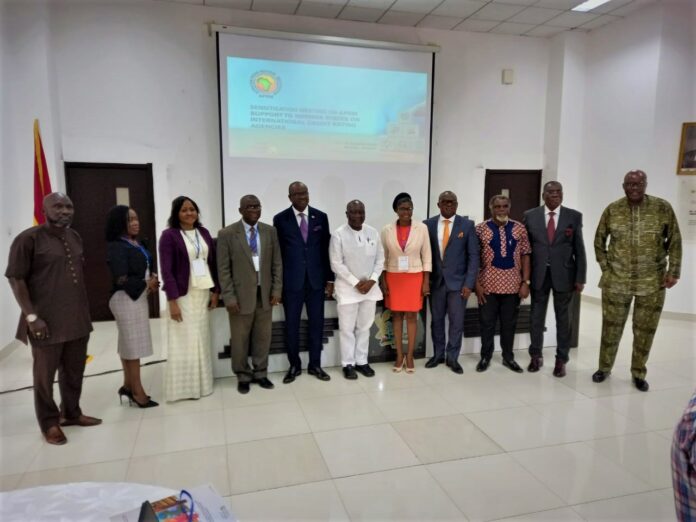William Nana Beeko || Chief Editor, AmaGhana Online
It came to light at a two-day sensitization workshop International Credit Rating last week that the African Union has come to the realization that ENOUGH is ENOUGH, in terms of the unassuming levels of negative credit rating of African economies by International Credit Rating Agencies.
The workshop, which was organised by the African Peer Review Mechanism (APRM) at the Ministry of Foreign Affairs in Accra designed for African Union (AU) member countries on International Credit Rating.
The meeting discussed the challenges faced by Ghana during its sovereign credit rating assessments and in implementing rating recommendations.
The event, which served as a platform for deeper discussions on International Credit Ratings informed key stakeholders in Ghana about the APRM work on supporting countries in the area of international credit ratings.
The APRM is an African-owned and African-led platform for self-assessment, peer-learning, and experience-sharing in democracy and good governance, in full respect for democratic principles, human rights, rule of law, the acceleration of political, social, and economic integration in Africa.
The main aim of this engagement was to improve the outcomes of future credit rating reviews through enhancing the engagements between international rating agencies and the representatives of the government.
APRM was tasked by the Specialized Technical Committee of Finance Ministers in 2018, to undertake a feasibility study for establishing an African Credit Rating agency.
The study found that it was feasible to establish such an institution as an independent entity of the African Union to provide alternative and complimenting rating opinions.
At the 35th Ordinary Session of the AU Assembly of Heads of State and Government earlier this year February 2022 African Union Financial Institutions, urged African leaders to guard against the continuing consequential power of rating agencies on African economies.
This is because African governments have suffered unfair credit rating of their prevailing economic situations by International Credit Agencies.
These concerns have been given a hearing by the AU, and significant of all, is the good move that Ghana is setting the pace to help establish its own domestic Credit Rating Agencies.
The Ghana Stock Exchange (GSE) is implementing the process of establishing credit rating agencies in Ghana, to rate the issuance of bonds in order to bring some confidence and comfort to investors.
Indeed, this is timely and refreshing considering the challenging moments African governments have had to contend with as a result of poor credit ratings by these International Credit Rating Agencies.
As a matter of fact, the African Union championing the agenda for Africa’s own Credit Rating Agencies that will paint a true different picture of the economic situation of African governments is a big initiative to cheer home about in order to boost investor confidence and attraction.
International credit rating agencies wield tremendous power to influence market expectations and investors’ portfolio allocation decisions while their crisis-induced downgrades undermine macroeconomic fundamentals.
Once downgraded, like a self-fulfilling prophecy, even countries with strong macroeconomic fundamentals deteriorate to converge with model-predicted ratings.
Investors, however respond by raising the cost of borrowing or by withdrawing their capital, aggravating a crisis situation.
The impact of these rating downgrades has been far reaching and continues to threaten the sustainability of public debt due to high borrowing costs.
Since receiving the mandate to support countries from the AU Assembly, the APRM has achieved significant milestones, including developing a Policy Framework of mechanisms for the provision of support to countries in their engagements with international credit rating agencies.
These mechanisms include; Research and Advisory services, periodic engagements with three international rating agencies, technical and operational support to National Treasuries’ credit rating liaison teams, member states information-sharing and peer-learning platform.
All these are aimed at ensuring that International Credit Rating Agencies employ scientific methods of risk assessment that do not disadvantage African countries.
Recently, the APRM issued a statement and held meetings with Moody’s and Standard & Poor’s following the rating downgrade of the Government of Ghana’s long-term foreign currency sovereign rating in February pointing out the inaccuracies and haste rating decisions by rating agencies.
There is clear evidence that the rating agencies did not pay due attention to neither the rating action nor concerns raised by the Government of Ghana following these rating action.
This, amongst many other issues shows that ‘reforming the work of rating agencies’ is long overdue. Despite appealing against omissions and inaccuracies of key material information driving rating agencies’ decisions, no African country has ever succeeded in this endeavour.
The inadequacies in the regulation has left governments vulnerable to the irresponsible use of power by international credit rating agencies.
There is no appeal authority on the continent that can conduct a fair hearing of the country’s submissions and pronounce a decision.
Instead, the appeals are in accordance with the agency’s own rules, making international rating agencies both ‘the player and referee in Africa’. This is not the case in other territories.
African problems can best be told by our own African people since it doesn’t make any sense to allow outsiders to call the shorts and dictate the pace of our socio-economic development.
KUDOS to the AFRICAN UNION, APRM and Ghana!!!
We need our own now to tell our stories.
















































